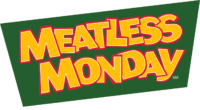20 Reasons to Go Meatless Monday
What sets Meatless Monday apart from the trendy diets and eating fads that have come and gone over the past twenty years? Well, Meatless Monday is not just about food. When you participate in Meatless Monday, you are joining a global effort working towards a healthier future.
Research shows that meat and dairy production have the greatest impacts on the environment compared to other human activities. Raising animals for food at the current quantity and scale produces a large amount of greenhouse gas emissions linked to climate change, while also depleting the planet’s scarce natural resources, like water, land, and energy. Eating too much meat can also have an adverse effect on personal health. Many studies have concluded that eating too much red and processed meat can increase our chances of developing cardiovascular disease, type 2 diabetes, and obesity, while a diet consisting of more plant-based foods, such as vegetables, fruits, whole grains and legumes, has been found to improve longevity and reduce the risk of these chronic conditions.
Meatless Monday is all about providing you with the tools and information necessary to help make plant-based foods a bigger part of your life. Yes, eating more fruits, vegetables, grains, and legumes is better for your health and the health of the environment, but it’s also a great way to expand your culinary horizon and discover new/exciting/delicious foods that you’ve never had the pleasure of trying before.
As we celebrate our twentieth anniversary this month, we hope that these twenty reasons to go Meatless Monday will help motivate you to spread the word about plant-based eating. Individually it is hard to make monumental change, but collectively we can make a difference. And it all starts with cutting out meat, one day a week.
1. Discover new ingredients and recipes There are so many fruits, vegetables, grains, and plant-based products available. Use Meatless Monday as an opportunity to try as many as you can!
2. Expand your culinary skills New recipes and ingredients push you to adopt some creative cooking techniques. Meatless Monday is the day to learn and try something new.
3. Support friends and family. Show your loved ones how delicious plant-based meals can be.
4. Save some money. Ingredients like beans, lentils, and tofu are cost-effective protein sources that are typically less expensive than many types of meat and poultry. One study found people saved 16% on food costs on a plant-based diet.
5. Enjoy delicious new/exciting/innovative foods! Never tried Buffalo cauliflower bites, jerk tofu tacos, or roasted balsamic Brussels sprouts? Going Meatless Monday gives you the opportunity to experiment with different foods.
6. Reduce risk of cardiovascular disease. Eating more plant-based foods and less red meat/processed meat can reduce the risk of developing heart disease.
7. Reduce risk of developing type 2 diabetes. Skipping even a half serving of meat every day and replacing it with a plant protein like beans or tofu can help prevent type 2 diabetes.
8. Promote kidney health. Eating more plant-based foods and less red meat/processed meat can help support healthy kidneys.
9. Get familiar with plant-based proteins. It’s a myth that you can’t get protein from plants. Ingredients like whole grains, beans, lentils, tofu, tempeh, nuts, seeds, oats, and edamame are all excellent sources of plant-based protein.
10. Save water. Producing ONE quarter-pound beef burger uses 425 gallons of water – enough water to fill 10 bathtubs.
11. Save energy. Producing ONE quarter-pound beef burger uses up enough energy to power an iPhone for 6 months.
12. Save trees. Raising animals for meat, dairy, and egg production requires a significant amount of land, leading to deforestation and the loss of other carbon sequestering natural lands.
13. Reduce your carbon footprint. Livestock production creates more greenhouse gasses than all the cars, trucks, planes, and trains in the world…combined!
14. Support soil health: Industrial livestock production, through its intensive land management practices, reduces soil fertility and leaves previously fertile regions barren and more prone to natural disaster such as wildfires, flooding, and dust storms. Wide-scale shifts toward more plant-based diets would carry tremendous benefits for soil health and biodiversity.
15. Find new restaurants to try: Committing to cutting out meat one day per week, pushes you to try new restaurants, dishes, and cuisines. Search for places in your area that specialize in meat-free and plant-based cooking. Even fast-food and chain restaurants may have some meatless options that you may have overlooked in the past…
